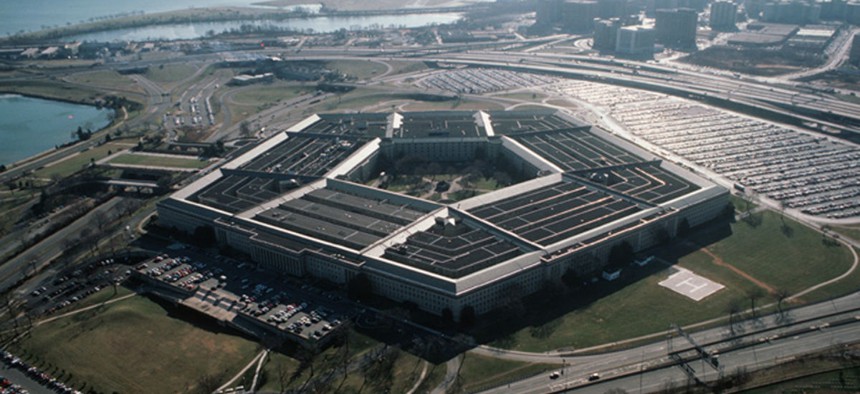
Defense Department file photo
Ex-Pentagon Official Blasts Political Parties for 'Crisis' in Washington
John Hamre asks government management experts to take lead in fixing dysfunction.
Deploying rhetoric unusually charged for a think tank conference, former Deputy Defense Secretary John Hamre on Thursday excoriated the Republican and Democratic parties for causing a “collapse in our political system” that risks becoming a crisis of government that discredits agencies in the public mind.
“The Democrats are dying of old age, Republicans are committing suicide,” said Hamre, the Pentagon comptroller in the Clinton administration who is now president and CEO of the Center for Strategic and International Studies. In the presidential candidate debates, “I hear anger and vituperation, but I don’t hear vision, and I’m struggling to hear concepts of America’s future,” he said.
Keynoting the fall meeting of the National Academy of Public Administration in Arlington, Va., with the theme “A Framework to Strengthen Governance,” Hamre blasted the “nonsense” of Donald Trump’s presidential bid that includes “making America great again but mocks people with disabilities.” He said a Trump presidency would be “complete disaster.”
Both parties “are struggling to find relevance to the future of America but are not succeeding,” Hamre told the audience of active, semi-retired and retired federal managers. “We now have the worst of both worlds--the Democrats succeeded in demanding a big government, and Republicans succeeded in starving it.”
Even so, the nation’s democratic institutions, Hamre cautioned, remain legitimate, and it may fall to those in the good-government management community over the next 15 years to find a new model not based on “traditional structures”—and perhaps new political parties.
Part of that means reforming the civil service, which is “constipated and based on a 70-year-old model, like General Motors of 1957,” Hamre said. The Office of Personnel Management “is on its back” because of the data breach of personnel files and problems with security clearances, he said.
At the Defense Department, “it’s easier to get a contractor than an employee because the hiring process is so cumbersome,” said Hamre, who worked for years as a staffer on the Senate Armed Services Committee and the Congressional Budget Office. Half the former staff at the Defense Secretary’s Office now work for SAIC, he joked.
“Our rules-based, compliance-based federal employees don’t know enough to interact with the private sector,” Hamre said, citing Finland and Norway as models of governments run by “a highly paid civil service that is competent [enough] to interact with the private sector.”
For example, during the 2010 Deepwater Horizon Gulf of Mexico oil spill, “No one in the Obama administration knew what to do because big oil was on their blacklist, so they called on me to bring them together,” Hamre said. He slammed the Obama administration’s early crackdown on lobbyist access, saying it had “stigmatized” a constitutionally protected practice and was “intentionally making ourselves stupid as a government.” He said he was appalled that the Chief of Naval Operations was nearly prevented from speaking to CSIS because his government attorney said the appearance would be seen as a “gift” that should only occur with organizations that are contractors. “The private sector can’t get in to talk to government, and we get lowest common denominator public meetings,” Hamre said.
Calling for a new approach to government ethics and financial disclosure for appointees, Hamre said the government should stop trying to “engineer moral purity. I wouldn’t go into government again because wouldn’t fill out the forms,” he added.
With political parties that focus solely on one-upping the other for the next election, Hamre said, “change won’t come soon.” But “now is the time” for those who are committed to the good things that government goes—in food inspection and roadway safety, for example—“to get out of their comfort zones” and act to end this “crisis of politics” because “we can’t afford for it to become a crisis of government.”







